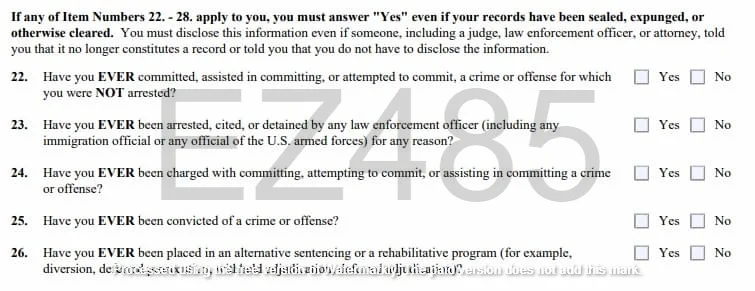Demystifying Part 12 of the N-400 Form: Additional Information About You (Person Applying for Naturalization) (4)
Becoming a U.S. citizen is a significant milestone in the lives of many immigrants. Part of the naturalization process includes filling out Form N-400, the Application for Naturalization. Within this comprehensive application, Part 12, titled “Additional Information About You (Person Applying for Naturalization),” plays a critical role in assessing an applicant’s eligibility for U.S. citizenship. This section delves into various aspects of an applicant’s background, with specific focus on legal matters. In this article, we will explore the importance of this section and provide a case study to illustrate its practical application.
The Significance of Questions 22 to 29
Questions 22 to 29 are central to this section as they require applicants to provide a detailed account of their legal history. It is imperative that individuals seeking naturalization approach these questions with transparency and honesty to ensure a successful application process. Let’s delve into the specifics of these questions:
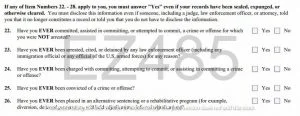
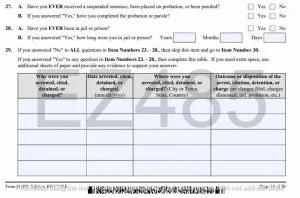
Question 22: Have you EVER committed, assisted in committing, or attempted to commit, a crime or offense for which you were NOT arrested? (Yes or No)
This question compels applicants to disclose any involvement in criminal activities, even if they were not apprehended by law enforcement. The U.S. government places high importance on transparency and integrity throughout the naturalization process.
Question 23: Have you EVER been arrested, cited, or detained by any law enforcement officer for any reason? (Yes or No)
Applicants must provide information about any encounters with law enforcement, which includes arrests, citations, or detentions, regardless of the outcome or the nature of the incident.
Question 24: Have you EVER been charged with committing, attempting to commit, or assisting in committing a crime or offense? (Yes or No)
This question requires applicants to disclose whether they have been formally charged with criminal activities, including both successful and attempted offenses.
Question 25: Have you EVER been convicted of a crime or offense? (Yes or No)
Applicants are obliged to reveal any prior convictions, regardless of the severity of the offense, whether it is a felony or misdemeanor.
Question 26: Have you EVER been placed in an alternative sentencing or a rehabilitative program (for example, diversion, deferred prosecution, withheld adjudication, deferred adjudication)? (Yes or No)
Applicants must communicate if they have been enrolled in alternative sentencing or rehabilitation programs, such as deferred adjudication or diversion, often utilized for less serious offenses.
Question 27A: Have you EVER received a suspended sentence, been placed on probation, or been paroled? (Yes or No)
Applicants should report if they have ever received a suspended sentence, probation, or parole. This information is vital in assessing an applicant’s legal history.
Question 27B: If you answered “Yes” to Question 27A, have you completed the probation or parole? (Yes or No)
For those who answered “Yes” to Question 27A, it is crucial to specify whether they have successfully completed their probation or parole.
Question 28A: Have you EVER been in jail or prison? (Yes or No)
Applicants must disclose whether they have ever been incarcerated, even for a brief period. The nature and duration of the confinement are vital details.
Question 28B: If you answered “Yes” to Question 28A, how long were you in jail or prison?
For those who answered “Yes” to Question 28A, providing the duration of their incarceration is necessary.
Question 29: If you answered “No” to ALL questions in Item Numbers 23 to 28, then skip this item and go to Question 30. If you answered “Yes” to any question in Item Numbers 23 to 28, then complete this table.
This question serves as a summary and ensures that applicants who answered “Yes” to any of the questions from 23 to 28 provide a comprehensive account of their legal history.
Case Study: Maria’s Journey
To illustrate the practical application of these questions, we introduce Maria da Silva, a fictional persona embarking on her path to U.S. citizenship.
Maria’s Background:
- Maria is a lawful permanent resident in the United States.
- She has been residing in the U.S. for the past six years.
- Maria understands the importance of providing honest and accurate information in her naturalization journey.
Maria’s Responses:
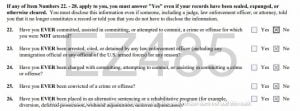
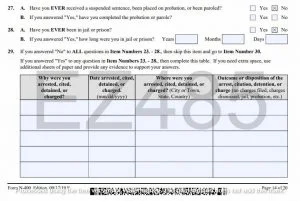
Question 22: Have you EVER committed, assisted in committing, or attempted to commit, a crime or offense for which you were NOT arrested? (No)
Maria’s Response: No, Maria has never been involved in any unreported criminal activities.
Question 23: Have you EVER been arrested, cited, or detained by any law enforcement officer for any reason? (No)
Maria’s Response: No, Maria has never been arrested, cited, or detained by any law enforcement officer.
Question 24: Have you EVER been charged with committing, attempting to commit, or assisting in committing a crime or offense? (No)
Maria’s Response: No, Maria has never been formally charged with any criminal activities.
Question 25: Have you EVER been convicted of a crime or offense? (No)
Maria’s Response: No, Maria has never been convicted of any crimes or offenses.
Question 26: Have you EVER been placed in an alternative sentencing or a rehabilitative program (for example, diversion, deferred prosecution, withheld adjudication, deferred adjudication)? (No)
Maria’s Response: No, Maria has never participated in any alternative sentencing or rehabilitative programs.
Question 27A: Have you EVER received a suspended sentence, been placed on probation, or been paroled? (No)
Maria’s Response: No, Maria has never received a suspended sentence, been on probation, or been paroled.
Question 27B: If you answered “Yes” to Question 27A, have you completed the probation or parole? (N/A)
Maria’s Response: Not applicable, as she answered “No” to Question 27A.
Question 28A: Have you EVER been in jail or prison? (No)
Maria’s Response: No, Maria has never been in jail or prison.
Question 28B: If you answered “Yes” to Question 28A, how long were you in jail or prison? (N/A)
Maria’s Response: Not applicable, as she answered “No” to Question 28A.
Question 29: If you answered “No” to ALL questions in Item Numbers 23 to 28, then skip this item and go to Question 30. If you answered “Yes” to any question in Item Numbers 23 to 28, then complete this table. (N/A)
Maria’s Response: Not applicable, as she answered “No” to all questions in Item Numbers 23 to 28.
Maria’s journey showcases the importance of truthfully addressing each question in the “Additional Information About You (Person Applying for Naturalization)” section. Her commitment to providing accurate and honest information aligns with the principles of integrity and transparency essential in the naturalization process.
Filing Fee
Before concluding, it’s important to address the filing fee associated with Form N-400. The filing fee for this application is $640, with an additional $85 biometric fee where applicable. Here are some essential details about the filing fee:
- If you choose to file Form N-400 online, you can conveniently pay the fee electronically.
- If you opt for a paper application, you may pay the fee with a money order, personal check, cashier’s check, or by credit card using Form G-1450, Authorization for Credit Card Transactions. Ensure that your check is made payable to the U.S. Department of Homeland Security.
- It’s crucial to understand that filing and biometric service fees are non-refundable, regardless of the outcome of your application or any subsequent decisions.
- If you are 75 years of age or older, you are exempt from the biometric fee, and you only need to pay the $640 filing fee.
- Military applicants filing under section 328 or 329 of the INA are exempt from both the filing fee and biometric services fee.
In conclusion, the “Additional Information About You (Person Applying for Naturalization)” section of Form N-400 is a crucial element of the naturalization process. It requires applicants to provide detailed information about their legal history. Ensuring transparency and honesty while answering these questions is fundamental to a successful application. Every detail matters, and truthful responses pave the way for a brighter future as a U.S. citizen.
